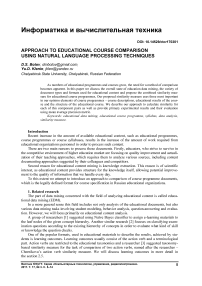Approach to educational course comparison using natural language processing techniques
Автор: Botov D.S., Klenin Yu.D.
Рубрика: Информатика и вычислительная техника
Статья в выпуске: 3 т.17, 2017 года.
Бесплатный доступ
As numbers of educational programmes and courses grow, the need for a method of comparison becomes apparent. In this paper we discuss the overall state of education data mining, the variety of document types and formats used for educational content and propose the combined similarity measure for educational course programmes, Our proposed similarity measure uses three most important in our opinion elements of course programmes - course descriptions, educational results of the course and the structure of the educational course. We describe our approach to calculate similarity for each of this component pairs as well as provide primary experimental results and their evaluation using mean average precision metric.
Educational data mining, educational course programme, syllabus, data analysis, similarity measure
Короткий адрес: https://sciup.org/147155208
IDR: 147155208 | УДК: 004.855 | DOI: 10.14529/ctcr170301
Список литературы Approach to educational course comparison using natural language processing techniques
- Saini P.S., Sona D., Veeramachaneni S., Ronchetti M. Making E-learning better through Machine Learning. International Conference on Methods and Technologies for Learning, 2005, pp. 1-6.
- Foley J., Allan J. Retrieving Hierarchical Syllabus Items for Exam Question Analysis. Advances in Information Retrieval, March 2016, pp. 575-586.
- Chernikova E., Nikolaev P. The Similarity Measure and Algorithm for Comparison of the Learning Outcomes. Proceedings of the Fourth International Conference on Internet Technologies and Applications, 2011, pp. 465-473.
- Chung H., Kim J. An Ontological Approach for Ssemantic Modelling of Curriculum and Syllabus in Higher Education. International Journal of Information and Education Technology, 2016, vol. 6, no. 5, pp. 365-369 DOI: 10.7763/IJIET.2016.V6.715
- Oprea M. On the Use of Educational Ontologies as Support Tools for Didactical Activities. Proceedings of the International Conference on Virtual Learning(ICVL2012), Nov. 2012, pp. 67-73.
- Botov D., Klenin J. Educational Content Semantic Modelling for Mining of Training Courses according to the Requirements of the Labor Market. Proceedings of the 1st International Workshop on Technologies of Digital Signal Processing and Storing, Russia, Ufa, UGATU, 2015, pp. 214-218.
- Berry M.W., Kogan J. Text Mining: Theory and Applications. John Wiley & Sons Ltd, The Atrium, Southern Gate, Chichester, West Sussex, PO19 8SQ, United Kingdom, 2010, pp. 3-19.
- Mikolov T., Sutskever I., Chen K., Corrado G.S., Dean J. Distributed Representations of Words and Phrases and their Compositionality. Advances in Neural Information Processing Systems, 2013, pp. 3111-3119.
- Rehurek R., Sojka P. Software Framework for Topic Modelling with Large Corpora. Proceedings of the LREC 2010 Workshop on New Challenges for NLP Frameworks, Malta, Valletta, 2010, pp. 45-50.


